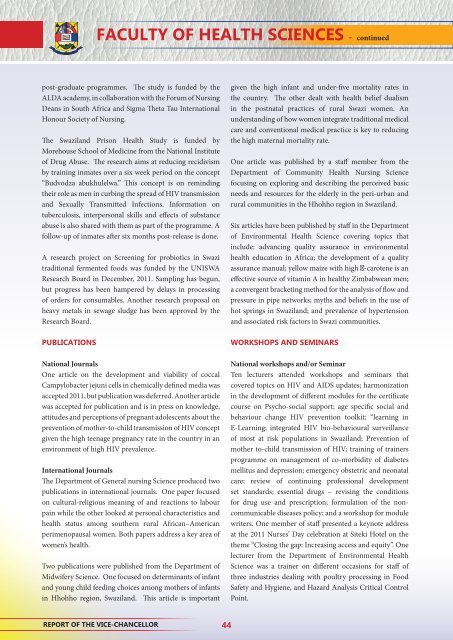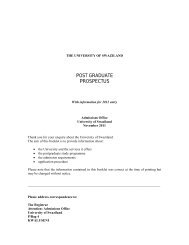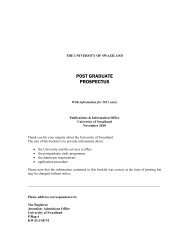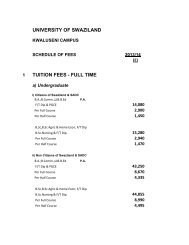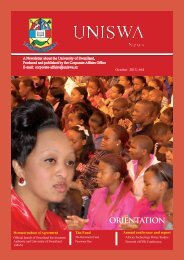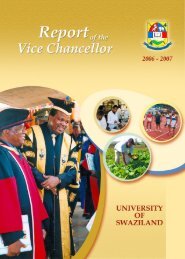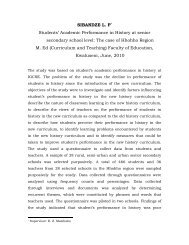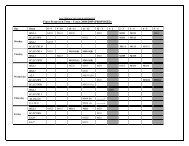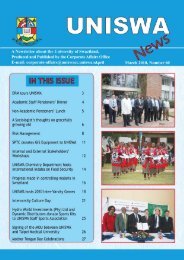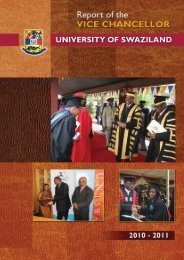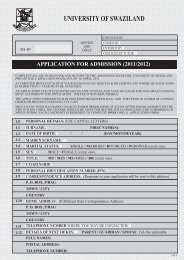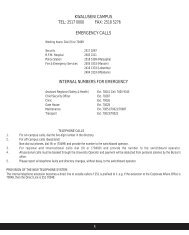CAMPUSES & CENTRES
2011/2012 - University of Swaziland
2011/2012 - University of Swaziland
Create successful ePaper yourself
Turn your PDF publications into a flip-book with our unique Google optimized e-Paper software.
FACULTY OF HEALTH SCIENCES - continuedpost-graduate programmes. The study is funded by theALDA academy, in collaboration with the Forum of NursingDeans in South Africa and Sigma Theta Tau InternationalHonour Society of Nursing.The Swaziland Prison Health Study is funded byMorehouse School of Medicine from the National Instituteof Drug Abuse. The research aims at reducing recidivismby training inmates over a six week period on the concept“Budvodza abukhulelwa.” This concept is on remindingtheir role as men in curbing the spread of HIV transmissionand Sexually Transmitted Infections. Information ontuberculosis, interpersonal skills and effects of substanceabuse is also shared with them as part of the programme. Afollow-up of inmates after six months post-release is done.A research project on Screening for probiotics in Swazitraditional fermented foods was funded by the UNISWAResearch Board in December, 2011. Sampling has begun,but progress has been hampered by delays in processingof orders for consumables. Another research proposal onheavy metals in sewage sludge has been approved by theResearch Board.PUBLICATIONSNational JournalsOne article on the development and viability of coccalCampylobacter jejuni cells in chemically defined media wasaccepted 2011, but publication was deferred. Another articlewas accepted for publication and is in press on knowledge,attitudes and perceptions of pregnant adolescents about theprevention of mother-to-child transmission of HIV conceptgiven the high teenage pregnancy rate in the country in anenvironment of high HIV prevalence.International JournalsThe Department of General nursing Science produced twopublications in international journals. One paper focusedon cultural-religious meaning of and reactions to labourpain while the other looked at personal characteristics andhealth status among southern rural African–Americanperimenopausal women. Both papers address a key area ofwomen’s health.Two publications were published from the Department ofMidwifery Science. One focused on determinants of infantand young child feeding choices among mothers of infantsin Hhohho region, Swaziland. This article is importantgiven the high infant and under-five mortality rates inthe country. The other dealt with health belief dualismin the postnatal practices of rural Swazi women. Anunderstanding of how women integrate traditional medicalcare and conventional medical practice is key to reducingthe high maternal mortality rate.One article was published by a staff member from theDepartment of Community Health Nursing Sciencefocusing on exploring and describing the perceived basicneeds and resources for the elderly in the peri-urban andrural communities in the Hhohho region in Swaziland.Six articles have been published by staff in the Departmentof Environmental Health Science covering topics thatinclude: advancing quality assurance in environmentalhealth education in Africa; the development of a qualityassurance manual; yellow maize with high -carotene is aneffective source of vitamin A in healthy Zimbabwean men;a convergent bracketing method for the analysis of flow andpressure in pipe networks; myths and beliefs in the use ofhot springs in Swaziland; and prevalence of hypertensionand associated risk factors in Swazi communities.WORKSHOPS AND SEMINARSNational workshops and/or SeminarTen lecturers attended workshops and seminars thatcovered topics on HIV and AIDS updates; harmonizationin the development of different modules for the certificatecourse on Psycho-social support; age specific social andbehaviour change HIV prevention toolkit; “learning inE-Learning; integrated HIV bio-behavioural surveillanceof most at risk populations in Swaziland; Prevention ofmother to-child transmission of HIV; training of trainersprogramme on management of co-morbidity of diabetesmellitus and depression; emergency obstetric and neonatalcare; review of continuing professional developmentset standards; essential drugs – revising the conditionsfor drug use and prescription; formulation of the noncommunicablediseases policy; and a workshop for modulewriters. One member of staff presented a keynote addressat the 2011 Nurses’ Day celebration at Siteki Hotel on thetheme “Closing the gap: Increasing access and equity”. Onelecturer from the Department of Environmental HealthScience was a trainer on different occasions for staff ofthree industries dealing with poultry processing in FoodSafety and Hygiene, and Hazard Analysis Critical ControlPoint.REPORT OF THE VICE-CHANCELLOR 44


